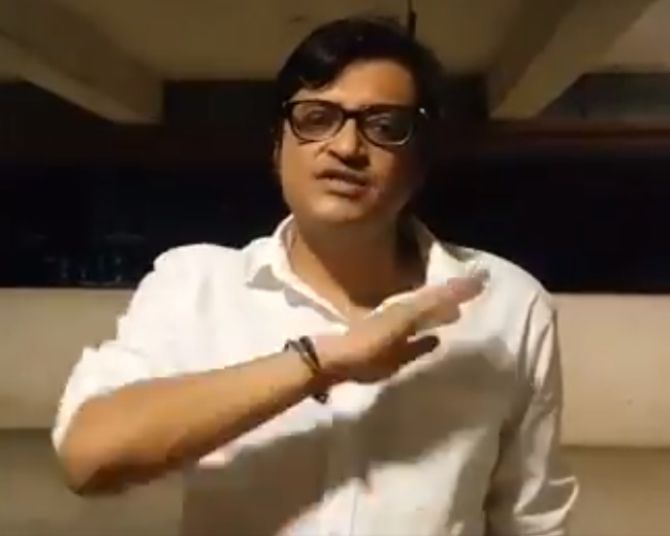The Supreme Court on Tuesday refused to quash the initial first information report against Republic TV Editor-in-chief Arnab Goswami over his news show on the Palghar mob lynching but gave some relief by setting aside related multiple FIRs and complaints holding they had a ‘stifling’ effect on the exercise of freedom and expression.
Observing that free citizens cannot exist when the news media is chained to adhere to one position, the court said journalistic freedom lies at ‘the core’ of the fundamental right to free speech and India’s freedom will rest safe as long as journalists can speak to power without being ‘chilled by a threat of reprisal’.
Seeking to balance the rights of journalists and accountability, the court, however, said exercising the fundamental right to speech and expression is not absolute and is answerable to the legal regime.
A bench of Justices D Y Chandrachud and M R Shah, which pronounced the verdict through video conferencing on two pleas filed by Goswami for quashing of FIRs and complaints against him, also rejected his prayer to transfer the probe to the Central Bureau of Investigation(CBI), saying the precedents of this court emphasise that this is an ‘extraordinary power’ to be used ‘sparingly’ and ‘in exceptional circumstances’.
In all, it quashed 14 FIRs and complaints lodged in different States against Goswami, which were stayed on April 24, saying that they are founded on the basis of same cause of action, worded in identical terms and as per a 2001 verdict, successive FIRs would constitute an ‘abuse of the statutory power of investigation’.
The top court, however, rejected the prayer to quash the FIR initially lodged in Nagpur city and transferred later to NM Joshi Marg police station in Mumbai, granted protection to Goswami from any coercive action for three more weeks from today and said he can approach the competent court for quashing of the FIR and availing any remedy as per law.
It also dismissed another petition filed by Goswami seeking to quash the FIR lodged at Pydhonie police station in south Mumbai on May 2, for allegedly hurting religious sentiments by making some remarks during his news show on the gathering of migrants outside Bandra railway station last month.
The top court granted Goswami liberty to pursue his remedies under the law in respect of this FIR too and granted him three weeks protection from today from any coercive action.
The effect of the order by the apex court will be that Goswami will be facing investigations in two FIRs — lodged at NM Joshi Marg police station and at Pydhonie police station, both at Mumbai.
“The exercise of journalistic freedom lies at the core of speech and expression protected by Article 19(1)(a). The petitioner (Goswami) is a media journalist.
“The airing of views on television shows which he hosts is in the exercise of his fundamental right to speech and expression under Article 19(1)(a). India’s freedoms will rest safe as long as journalists can speak to power without being chilled by a threat of reprisal,” the bench said.
The top court also said that exercising fundamental right to speech and expression is not absolute and is answerable to the legal regime enacted with reference to the provisions of Article 19(2).
“But to allow a journalist to be subjected to multiple complaints and to the pursuit of remedies traversing multiple states and jurisdictions when faced with successive FIRs and complaints bearing the same foundation has a stifling effect on the exercise of that freedom,” it said.
The bench, in its 56-page verdict said that allowing a journalist to be subjected to multiple complaints will effectively destroy the freedom of the citizen to know of the affairs of governance in the nation and the right of the journalist to ensure an informed society.
“Our decisions hold that the right of a journalist under Article 19(1)(a) is no higher than the right of the citizen to speak and express. But we must as a society never forget that one cannot exist without the other. Free citizens cannot exist when the news media is chained to adhere to one position,” it added.
The bench clarified that the FIR being probed by the Mumbai police regarding the news show on Palghar mob lynching will not cover the offence of defamation as the complaint has not been made at the behest of the person who is aggrieved.
It, however, said that quashing of multiple FIRs lodged in different states would not have a bearing on the probe into the FIR being probed by Mumbai police.
The top court also barred lodging of any fresh FIR or complaint in respect to the same cause of action emanating from the broadcast on April 21 by the petitioner on R.Bharat(Republic Bharat) and said they will be not maintainable.
It asked the Commissioner of Police to consider the request of Goswami for providing him security at the residence and at the business establishment in Mumbai, in accordance with law.
The top court added that based on the threat perception, police protection may be provided if it is considered appropriate and for the period during which the threat perception continues.
It also dismissed the intervention application field by Maharashtra government alleging that Goswami has been misusing protection granted by the top court and has been ‘browbeating’ the police by ‘creating fear psychosis’ and said it is open to the investigating agency to urge its submissions before the competent court.
The multiple FIRs and complaints against Goswami were registered in different states after his news shows aired on Republic TV on April 16, and R. Bharat on April 21 on lynching of three individuals (including 2 sadhus/priests) in Palghar in Maharashtra on April 16.




